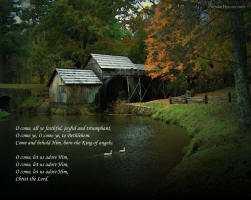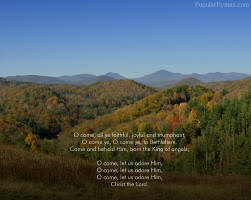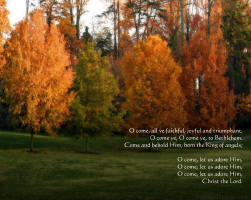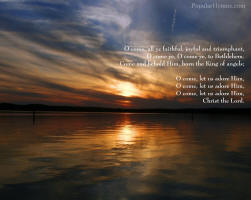|
O come, all ye faithful, joyful and
triumphant,
O come ye, O come ye, to Bethlehem.
Come and behold Him, born the King of angels;
Refrain
O come, let us adore Him,
O come, let us adore Him,
O come, let us adore Him,
Christ the Lord.
True God of true God, Light from Light Eternal,
Lo, He shuns not the Virgins womb;
Son of the Father, begotten, not created;
Refrain
Sing, choirs of angels, sing in exultation;
O sing, all ye citizens of heaven above!
Glory to God, all glory in the highest;
Refrain
See how the shepherds, summoned to His cradle,
Leaving their flocks, draw nigh to gaze;
We too will thither bend our joyful footsteps;
Refrain
Lo! star led chieftains, Magi, Christ adoring,
Offer Him incense, gold, and myrrh;
We to the Christ Child bring our hearts oblations.
Refrain
Child, for us sinners poor and in the manger,
We would embrace Thee, with love and awe;
Who would not love Thee, loving us so dearly?
Refrain
Yea, Lord, we greet Thee, born this happy morning;
Jesus, to Thee be glory given;
Word of the Father, now in flesh appearing.
Refrain
Story:
John Francis Wade was an itinerant scribe. In those days long ago,
when printing was still in its infancy and a rather slow way of
reproducing copies of a work, he roamed from time to time offering his
services to those who could pay for them.
Wade was a craftsman of the highest order, working in several
languages and able also to copy music manuscripts. Consequently, his
copywriting was much in demand by choir leaders, institutions of
learning, churches and wealthy families.
He worked mostly in his native England but also ventured as far afield
as France and some of the Western European countries to ply his trade
there.
Apparently, however, scribe Wade didn't spend all his time copying the
works of others. In 1750, as part of a manuscript he prepared for a
college in Lisbon, Portugal, he included an original composition from
his own pen,
It was written in the Latin language and began ...
Adeste, fideles,
Laeit triumphantes;
Venite, venite in Bethlehem ...
In English, it's the very popular...
O come, all ye faithful, joyful and triumphant,
O come ye, O come ye to Bethlehem ...
Wade also composed a fine tune for the words he had written, and when
the two were blended they produced an extraordinary musical
composition. It's sung with great enthusiasm in churches all over the
world at Christmas.
In 1785 the carol was heard by the then Duke of Leeds. He introduced
it to a group of concert singers of which he was the conductor and it
increased in popularity from that time.
Eventually, it circled the globe, being translated into the language
of every civilised nation on the way. In the past century for example,
it has appeared in over one hundred different English translations.
However, it was not until 1852, and the translation by Canon Frederick
Oakley of Shrewsbury, that it became known by its present popular
title "O Come All Ye Faithful."
It should be pointed out that some historians assert that John Francis
Wade was not, in fact, the author of this carol. They say he borrowed
both the words and music from others whose names we will never know.
But whether or not Wade was guilty of plagiarism, it is undeniable
that this moving carol would never have come into the possession of
the Christian church had he not inserted it into that ancient
manuscript.
Amen! Lord we bless thee
Born for our salvation,
O Jesus! forever be Thy name adored;
Word of the Father,
Now in flesh appearing.
O come let us adore Him,
Christ the Lord!
Bible Verses
Luke 2:15 -
And it came to pass, as the angels were gone away
from them into heaven, the shepherds said one to another, Let us now
go even unto Bethlehem, and see this thing which is come to pass,
which the Lord hath made known unto us.
Desktop Backgrounds for O Come All Ye
Faithful
(Click on picture to view full-size)




|









